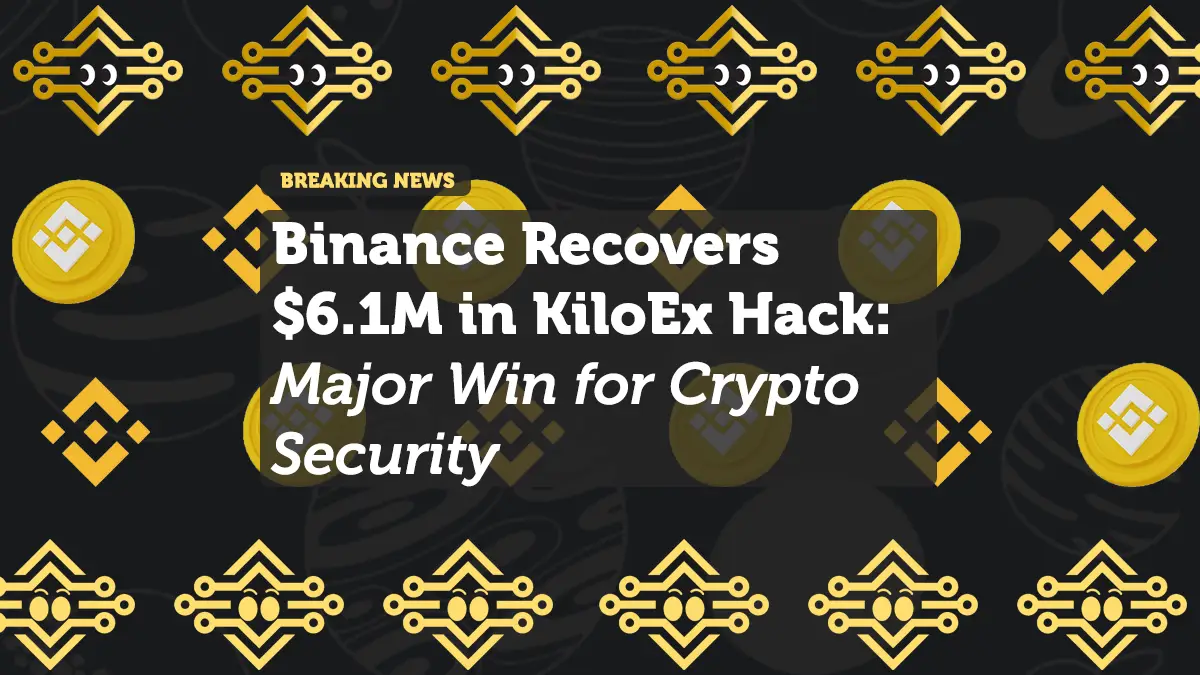
Binance Recovers $6.1M in KiloEx Hack: Major Win for Crypto Security
Two weeks after KiloEx, a decentralized exchange (DEX), suffered a $7.5 million exploit due to a flawed price oracle system, Binance has helped recover a massive portion of the stolen funds — approximately $6.1 million. This unexpected recovery shines a light on the evolving role of centralized exchanges in aiding DeFi protocols under fire.
Let’s break it down.
What Happened in the KiloEx Exploit?
KiloEx, a relatively new decentralized trading platform operating across Base, BNB Chain, and Taiko, was targeted by a sophisticated exploit that took advantage of a vulnerability in its price oracle system. Oracles are external data feeds that smart contracts rely on to fetch accurate price data — when tampered with, they can become dangerous tools for malicious actors.
In this case, the attacker manipulated asset prices and executed trades that allowed them to drain the platform of millions in a matter of minutes.
Here’s how they did it:
- Manipulated the price oracle to inflate asset values.
- Cross-chain transactions were used to obfuscate activity.
- The attacker funded the wallet via Tornado Cash, a mixing service often linked to laundering stolen funds.
Binance’s Swift Response: Recovery and Containment
Under CEO Richard Teng, Binance’s security team quickly jumped into action. Once the exploit was reported, Binance:
- Tracked the attacker’s wallet addresses across affected blockchains.
- Blacklisted the attacker’s addresses, preventing funds from exiting through Binance.
- Worked with cybersecurity teams and law enforcement to support ongoing investigations.
Their response led to the recovery of over $6.1 million, roughly 90% of the stolen assets — a rare and major win in the world of DeFi exploits.
KiloEx’s Next Steps: Bounties, Compensation, and Transparency
Initially, KiloEx had offered a 10% white hat bounty to the hacker — a last-ditch effort to recover funds. But with Binance’s success, that offer is likely now void.
To support affected users, KiloEx launched a user compensation plan, including:
- Payouts for traders and Hybrid Vault stakeholders.
- Loss coverage up until trading resumes.
- Recommendations for users to close open positions immediately.
KiloEx resumed trading a few days after the breach, and while the exploit caused a dent in its credibility, the recovery effort helped restore some trust.
Why This Recovery Matters for DeFi and Web3
This isn’t just a win for KiloEx — it’s a case study in how centralized and decentralized entities can cooperate effectively to protect user funds.
Here’s what it means:
1. DeFi Security Is Still Catching Up
Exploits like these reveal ongoing vulnerabilities in oracle design and smart contract auditing. No matter how well-funded or audited a platform is, bad actors can still find ways in.
2. Centralized Players Are Becoming DeFi’s Safety Net
Binance’s involvement sets a precedent. Centralized exchanges — often criticized by DeFi purists — are showing their value in investigations and rapid response, especially with their infrastructure and compliance networks.
3. Cross-Chain Exploits Are the New Norm
The use of multiple networks (Base, BNB Chain, Taiko) shows that exploiters are growing more advanced — jumping chains to stay ahead of investigators. Security systems must now be cross-chain capable to match this level of sophistication.
Final Thoughts
The KiloEx incident reminds us of how vulnerable DeFi can be — but also how much the space has matured. Binance’s successful recovery of $6.1 million is more than just a headline; it’s a sign that Web3 isn’t as lawless as it once was.
The crypto ecosystem is slowly building stronger defense mechanisms, and the partnership between centralized security teams and decentralized platforms could be the blueprint moving forward.
Would you like a follow-up breakdown on how price oracle exploits work and what developers can do to prevent them?















